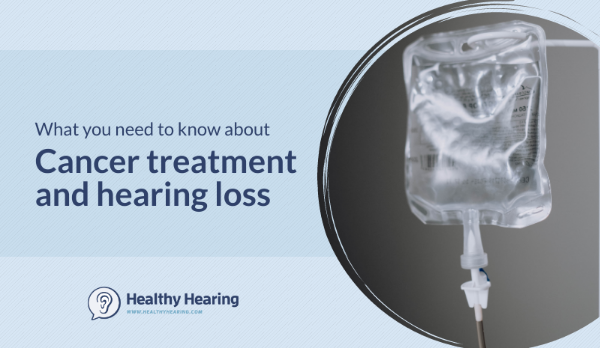While life-saving, many cancer chemotherapy drugs come with serious side effects. These include hearing-related side effects such as hearing loss, tinnitus (ringing in your ears) and balance problems. While sometimes these side effects are temporary and get better after treatment ends, often they’re permanent.
If you’re about to undergo cancer treatment—or have a child in those circumstances—here’s what you need to know.
The 3 main forms of cancer treatments can all affect your hearing
Cancer treatment typically relies on a trio of treatment options: radiation, surgery, and chemotherapy, often performed in conjunction—for instance, a person may have surgery followed by a course of radiation and chemotherapy.
All three cancer treatment options have the potential to damage hearing, depending on the location of the cancer.

Surgery
If you have a form of cancer that requires surgery in the brain, ear, or auditory nerve, hearing problems could occur, according to the Canadian Cancer Society (CCS). Removing a cancerous tumor, for instance, might cause damage to the ear.
Radiation
During radiation treatment, high-energy waves or particles are used to destroy or damage cancer cells. If radiation is needed anywhere in the head and neck, it can potentially lead to two types of hearing loss:
- Conductive hearing loss, a type of hearing loss that happens when sound doesn’t make its way to the inner ear, may occur. This is due to the ear canal being narrowed, the eardrum thickening, or other ear changes caused by radiation, according to a 2019 article published in the Journal of Neurologic Surgery. A condition called otitis media with effusion (OME), where fluid collects in the middle ear, occurs in nearly half of people who have radiation therapy in the head and neck, per the article.
- Sensorineural hearing loss, which arises with damage to the inner ear or auditory nerve, can also occur as a result of radiation. Higher doses of radiation are more likely to cause hearing loss, according to the journal article. People under age 3 and over age 50 are at a higher risk for this type of hearing loss, as are people being treated with the chemotherapy treatment cisplatin (more on that in a moment). This type of hearing loss is permanent.
Chemotherapy
Chemotherapy refers to the use of powerful chemicals that are capable of killing cancer cells. In some cases, chemotherapy drugs can be “ototoxic,” which means they are harmful to hearing.
About half of all patients who receive the chemotherapy drug cisplatin develop hearing-related side effects including hearing loss, tinnitus and vertigo. This is known as ototoxicity.
Platinum-based chemotherapy (cisplatin)
This is especially the case for chemotherapy known as platinum-based therapy (that is, chemo meds containing the element platinum). The most ototoxic platinum-based chemotherapy is cisplatin, according to a review article in Cancer Chemotherapy and Pharmacology. This medication is used to treat bladder, testicular, and ovarian cancer, according to the National Cancer Center.
“Not only hearing loss, but also tinnitus and imbalance are common in patients who receive platinum-based chemotherapy, and can cause debilitating effects upon quality of life,” the review article states.
Hearing-related side effects to this medication appear fairly common: Permanent hearing loss occurs in about half of all patients who take cisplatin, ASHA notes. It usually causes high-frequency hearing loss.
Scientists are still working to understand why cisplatin damages hearing—it may be because it easily enters the inner ear (while other drugs are blocked) but doesn’t seem to exit it, according to ASHA. Once in the inner ear, the medications may cause damage to hair cells, which are vital to the hearing process.
Other platinum-based chemotherapies that treat solid tumors, such as carboplatin and oxaliplatin, are less likely to damage hearing, although they can still cause issues. For instance, carboplatin can cause ringing in the ears (tinnitus), notes the Mayo Clinic.
Other chemo drugs
There are other chemotherapies that don’t fall into the platinum-based category that can still cause hearing problems or tinnitus. They include vincristine, doxorubicin, gemcitabine, cyclophosphamide, oxaliplatin, and farmorubicin, notes a 2016 study published in the Brazilian Journal of Otorhinolaryngology.
Radiation treatment combined with these ototoxic chemotherapy medications increases the risk for hearing-related issues. With higher doses of chemo meds, there’s a greater risk for hearing problems, according to CCS.
Non-cancer drugs can also cause problems
Keep in mind, other medications besides chemotherapy taken during cancer treatment—such as pain medications, anti-nausea meds, or antibiotics—can also lead to hearing problems. There are at least 200 medications linked to hearing loss, including over-the-counter medications like aspirin.
Hearing loss more likely among kids
Seventy-five per cent of patients five years old and younger had cisplatin-related hearing loss three years after starting therapy, a 2021 University of British Columbia study shows.
“Young children [are] particularly vulnerable to the ototoxic effects of cancer therapies,” affirms a 2016 review article in the journal Cancer. This is because the brain and ears are still forming in young childhood, the article notes.
Not only is hearing loss more common in children who take cisplatin, but it’s also more severe, per ASHA. Plus, even small amounts of hearing loss in high frequencies are a big deal to younger children acquiring language.
How to weigh the risks

for current and former cancer patients who
received treatment linked to hearing loss.
Cancer is a life-threatening disease, which is why doctors use powerful treatment methods, despite the host of known side effects. Knowing the potential risks is helpful, since it can help you assess if the risk is worth it to you personally. Talk to your doctor about the drug’s side effects and if there are any alternatives.
ASHA recommends following these steps if you are taking known ototoxic medications:
- Check your hearing: Ideally, do this before the treatment to have a baseline record of your hearing.
- Track changes: An audiologist can help you monitor hearing and balance during treatment, so that you can catch any issues quickly—it’s not always possible, but you may be able to pause or switch treatments.
- Get check-ups: Even after cancer treatment ends, it’s a good idea to get regular hearing checkups, especially in pediatric cases.
Can anything prevent treatment-related hearing loss?
Sometimes, an alternative therapy can be given if you’re particularly concerned about hearing loss or tinnitus. It’s very important to talk to your oncologist about the benefits and risks of the treatments you’re receiving.
Researchers are also looking at “otoprotective agents”—drugs that can protect hearing when given as the same time as harmful drugs, according to Research Outreach. For instance, ASHA points out that administering sodium thiosulfate (which is typically used to treat cyanide poisoning) may limit hearing loss from cisplatin in children. The trick is figuring out how to give patients otoprotective medications while still allowing chemotherapy medications to be effective.
Treating the hearing loss
If you’ve received cancer treatment and have permanent hearing loss, it’s important to see a hearing care provider for expert help. You may be a good candidate for hearing aids, cochlear implants, or assistive listening devices. Treating hearing loss not only helps you hear better, it’s also linked health benefits, including a reduced risk of depression and injury-causing falls.






